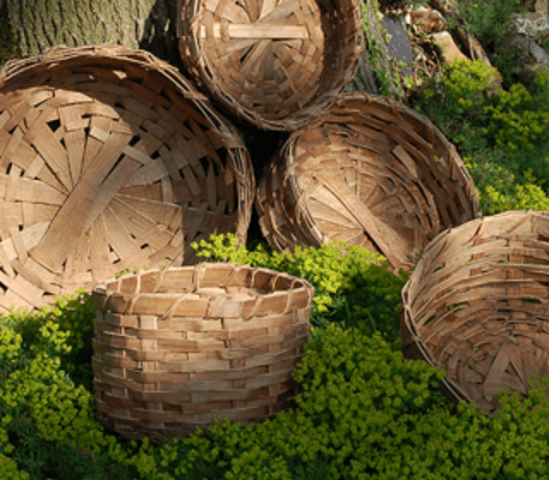The rural art of weaving mulberry baskets
Baskets made in Chichawatni are sold across Punjab and elsewhere in the country

PHOTO: FILE
Even today, 70% of Pakistan's rural population is engaged in agriculture.
Mulberry baskets play a significant role in scattering dung in the fields as fertiliser, covering food to protect it from eagles, crows and domestic birds or dogs and cats, storing fruits, vegetables and other agricultural commodities temporarily in the houses or transporting grain and vegetables from the field to the markets for sale. A decade and a half ago, Chichawatni was a major centre of the basket industry.
Spring fruit: Mulberry prices double in Lahore
In Chichawatni, baskets made of mulberry twigs and ‘chhaba’ were sent all over the country including Sindh, Sadiqabad, Rahim Yar Khan, Multan, Lahore, Pindi and Kasur.
A few years ago, mulberry trees were abundant in Blocks 2 and 3 of Chichawatni Forest and a regular permit was issued to cut the mulberry branches after the public auction but due to the negligence and connivance of the forest department's staff, no alternative mulberry trees were planted to alleviate the shortage caused by the timber mafia's rampant theft of mulberry trees. Now, mulberry trees are rarely found in this forest which led to a dramatic reduction in the required production of mulberry twigs and that's why permits aren't being issued. Craftsmen are forced to buy mulberry at high prices due to its unavailability at the commercial level.
Some artisans stated that mulberry sticks used to cost Rs 2,500 per acre, now they are demanding Rs 8,000 to Rs 10,000 per acre in the market and the cost has more than quadrupled which is unaffordable for farmers and cultivators.
The sharp rise in cost also had a very negative effect on the sale of baskets. As a result, the domestic industry such as baskets started vanishing.
The risks to the business of the artisans associated with the basket industry increased and over time the families associated with the industry shrunk.
Craftsmen who have been involved in the mulberry basket business for three generations said that if there was no problem with the availability of mulberry, a craftsman would make about twenty baskets in a day.
Punjab develops new mulberry variety
A craftsman highlighted that, ten years ago, the selling price of the mulberry basket in the market was Rs50 to Rs120, Chabba price was Rs 100 to Rs150 and and Dul price was Rs 100 to Rs 120. Basketmakers remarked that if the industry gets government patronage and the problems it faces are solved, the industry has the potential to earn a good amount of foreign exchange for the country.
According to Ashjar, an expert from Lahore, mulberry baskets are very important not only for their usefulness but also for being environmentally friendly. According to a mulberry basket maker, cardboard and plastic basket cannot be a substitute for a mulberry basket because fruits and vegetables can only get the freshness, moisture and oxygen they need in a mulberry basket and they are less likely to rot.
Published in The Express Tribune, June 22nd, 2020.



















COMMENTS
Comments are moderated and generally will be posted if they are on-topic and not abusive.
For more information, please see our Comments FAQ